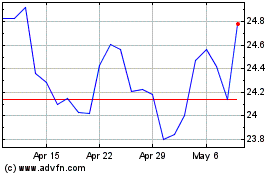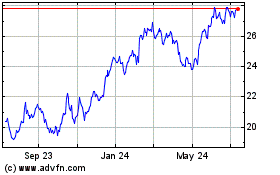AT&T Inc.'s practice of exempting its streaming video
services from data-usage caps is rankling competitors and shaping
up as a major issue for regulators set to weigh the telecom giant's
proposed $85.4 billion acquisition of Time Warner Inc.
When AT&T rolls out its $35-a-month DirecTV Now online TV
service this month, its wireless subscribers will be able to stream
as much as they want without it counting toward their monthly data
caps. But if the same customers binge on outside services like
Netflix or Hulu, those bits will add up—potentially leading to
surcharges.
Streaming services like Netflix, Hulu, Sling TV, Major League
Baseball spinoff BAMTech, as well as media companies like 21st
Century Fox, are likely to press regulators to scrutinize the
practice—known as "zero rating"—in their review of the
AT&T-Time Warner deal, people familiar with the matter said. TV
networks that have streaming apps, like CBS and ESPN, also may have
a stake in the matter. (21st Century Fox and Wall Street Journal
owner News Corp share common ownership.)
Several companies are likely to argue that AT&T's DirecTV
Now approach is anticompetitive, and will push for conditions on
the merger, the people say.
Some Federal Communications Commission staffers already view
AT&T's DirecTV Now exemption as an example of improper
zero-rating, people familiar with the situation said, because it
disadvantages AT&T's streaming rivals.
The agency is considering how to address zero-rating and whether
to raise it as a merger issue, the people said. Other options the
agency is weighing include industrywide guidelines on
zero-rating.
AT&T says zero-rating promotes competition. It says it
offers any company that wants to be zero-rated the same payment
terms available to its DirecTV subsidiary. But critics argue that
the in-house payments made by DirecTV don't require any net outlays
by the parent company, and so can't be compared to AT&T's
rivals paying for the same privilege.
FCC spokeswoman Shannon Gilson said: "Conversations to help
commission staff understand new offerings are ongoing."
AT&T officials also say zero-rating benefits consumers, a
view shared by some groups representing minority and low-income
communities. The practice helps streaming services and traditional
TV providers "compete nationwide with cable TV's bundle of TV and
broadband," said Bob Quinn, AT&T's senior executive vice
president for external and legislative affairs.
Current and former regulatory officials in Washington believe
that zero-rating could become the central internet policy issue in
the AT&T-Time Warner deal review—just as "net neutrality"
played a starring role during Comcast Corp.'s 2011 acquisition of
NBCUniversal and its failed 2015 bid to buy Time Warner Cable
Inc.
More than a week after the AT&T deal was announced, Wall
Street appears skeptical it will pass muster in Washington. Shares
of media giant Time Warner are trading about 17% below AT&T's
offer price of $107.50 a share.
AT&T began allowing companies to pay for zero-rating in
2014, but it isn't alone in doing so. Verizon Communications Inc.
zero-rates its go90 mobile video app and National Football League
games. So far, streaming services like Netflix, Amazon.com Inc.'s
video service and Spotify haven't paid, and so count toward both
carriers' data caps.
The FCC's net neutrality rules, issued in February 2015,
regulate the internet like a utility and require all traffic to be
treated equally. The agency didn't restrict zero-rating, but
reserved the right to police it.
Now, the AT&T-Time Warner deal could give regulators the
impetus to do so. The merger would link AT&T's massive
wireless, broadband and pay-TV businesses with content providers
like HBO, TNT and Warner Bros.
Some streaming companies and regulatory officials have come to
view T-Mobile US Inc.'s "Binge On" program as a more acceptable
form of zero-rating. Under that program, any video provider can be
exempted from T-Mobile's data caps free of charge if they agree to
have their video delivered at lower quality, taking up less
bandwidth. Moreover, customers and content companies can easily opt
out.
FCC Chairman Tom Wheeler has called the program
"innovative."
Jon Klein, a former CNN executive whose company TAPP operates
niche streaming services, said he would likely call for scrutiny of
AT&T-style zero-rating in the merger review.
"Zero-rating would no doubt have the effect of stamping out
small upstarts, or forcing them to accept unfavorable terms in
exchange for preferential distribution," he said.
The stakes are also high for bigger companies. Public-interest
advocates worry AT&T could start exempting Time Warner's HBO
Now streaming service from data caps, which would give HBO a leg up
over rival Netflix and its ilk.
Netflix is keeping all its options on the table, said a person
familiar with the company's thinking, including whether to oppose
the deal or merely seek conditions. The company's opposition to the
proposed Comcast-Time Warner Cable merger helped swing public
perception against that deal.
At the WSJDLive Conference in October, Netflix Chief Executive
Reed Hastings said it was important that "HBO's bits and Netflix's
bits are treated the same."
Regulators have made protecting internet TV a primary goal in
reviewing recent mergers. Earlier this year, they barred Charter
Communications from imposing home broadband caps or usage-based
pricing for seven years as a condition of their approval for its
Time Warner Cable purchase.
Still, the FCC has been hesitant to come down heavily against
zero-rating, people familiar with the agency's thinking said, based
on the idea that unlimited streaming could be seen as a benefit to
consumers, even if big companies had an advantage.
Late last year, the agency began closely studying zero-rating,
collecting information from companies including AT&T, which has
taken the view that any regulatory action on the subject should
apply to the rest of the industry.
Republican FCC Commissioner Michael O'Rielly agrees and has said
the agency's vague stance stifles innovation.
"These services live under a perpetual cloud of doubt," Mr.
O'Rielly said in a speech in September.
(END) Dow Jones Newswires
November 01, 2016 18:45 ET (22:45 GMT)
Copyright (c) 2016 Dow Jones & Company, Inc.
News (NASDAQ:NWSA)
Historical Stock Chart
From Mar 2024 to Apr 2024

News (NASDAQ:NWSA)
Historical Stock Chart
From Apr 2023 to Apr 2024
